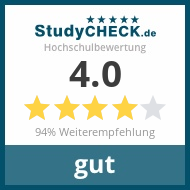Logistics Management (MBA) - International
React adequately and professionally to logistical challenges
Target group
- This course is designed for graduates who are already working in the fields of Logistics, Production, Sales, Controlling or IT and want to strengthen their management competence and entrepreneurial initiative in order to be able to react adequately and professionally to logistical challenges in industry, trade and services. This includes comprehensive knowledge and skills in market-oriented planning, design, management and control of material, goods and information flows in value networks and their application.
Advantages
Overview of the study contents
General Management (246 lessons)
a) Strategic and Operational Management
b) Controlling und Financial Management
c) Project Management
d) Information Management
Supply Chain Management (204 lessons)
a) Basics of Supply Chain Management
b) Planning Tasks in Supply Chain Management
c) Supply Chain Management Specialization
d) Production Planning and Quality Management
Applied Logistics Management (75 lessons)
a) Internet-supported Logistics Processes
b) ICT in Logistics
c) Environmental Management in Logistics
Master's thesis
After finishing these modules the students will complete their master's thesis.
For quality assurance after each group of lessons the lecturers will be evaluated by the participants and feedback-talks will be held. The internal quality assurance is done by the academic director of the program and the responsible boards at the Faculty of Business Management and Economics of the TU Dresden (study commission, examinations board).
Extracurricular Activities
a) German Course at the beginning of your studies
b) Cultural and Team Competences
c) Scientific Working
c) SAP Course
Scientific Director

Prof. Dr. Rainer Lasch
Lecturers
- Prof. Dr. Rainer Lasch, University of Technology Dresden; Scientific Director of the program
- Prof. Dr. Holger Müller, University of Applied Sciences Leipzig
- Prof. Dr. Udo Buscher, University of Technology Dresden
- Dipl.-Ing. Steffen Clauß, SYSTEMA GmbH Dresden
- Prof. Dr. Mario Straßberger, University of Applied Sciences Zittau-Görlitz
- Prof. Dr. Ulrike Stopka, University of Technology Dresden
- Dr. Norbert Wagener, Management Consultants GmbH Wagener & Herbst Potsdam
- Dr. Michael Graßmann, Unternehmensgruppe UKA Umweltgerechte Kraftanlagen GmbH & Co. KG, Meißen
- Dr. Marc Janka, Friedhelm Loh Group Loh Services GmbH, Haiger
- Dipl.-Wirtsch.-Ing. Patricia Leffler, University of Technology Dresden
- Dr. Ronald Hartz, University of Technology Ilmenau
- Dr. Xaver Heinicke, University of Technology Dresden
- Prof. Dr. Roy Fritzsche, University of Cooperative Education, Glauchau
- Dipl.-Wirtsch.-Ing. Darleen Dolch, University of Technology Dresden
- Dipl.-Wirtsch.-Ing. Marcel André Hoffmann, University of Technology Dresden
- RA Cord Tomhave, Kanzlei Heuking Kühn Lüer Wojtek
- PD Dr. rer. pol. habil. Janis Sebastian Neufeld, University of Technology Dresden
- Dipl.-Ing. Věra Greschner Farkavcová, United Nations University Dresden
- Dr. Andreas Wels, T-Systems
- Dr. rer. pol. Jacob Hamann-Lohmer, University of Technology Dresden
Admission requirements
- a first university degree (e. g. Bachelor) comparable to 240 ECTS-credits (or graduation after 8 semesters), preferably in Economics or Business Administration
- working experience of usually two years in the fields of Logistics, Production, Sales, Controlling or IT
- basic knowledge in the field of economics (proven with certificates if it was not part of your Bachelor studies)
- English language proficiency (on a level comparable to IELTS 6.0 or TOEFL 550 pbT/TOEFL 79 ibT)
Scholarship Information
The DAAD provides various kinds of funding for foreign students, graduates and postdocs as well as on funding offered by other selected organisations
Overview
- Degree:
- Master of Business Administration (MBA)
- Place of study:
- Dresden
- Program start:
- Spring: 01 April 2024
- Autum: 01 October 2024
- Duration:
- 18 months
- Credit Points:
- 60 Points
- Program type:
- Full time
- Tuition fees:
- 917 € per month













